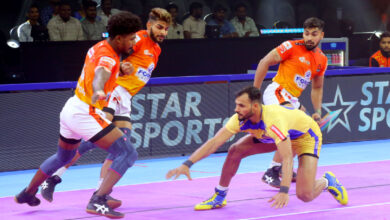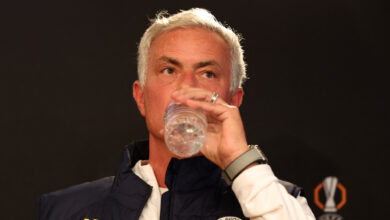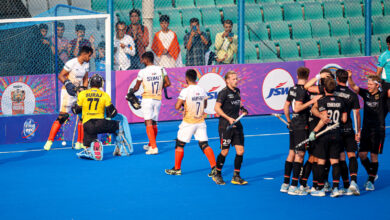For CSK fans, MS Dhoni will remain Captain For Life

Stage stage, like a man approaching the vanaprastham, MS Dhoni is renouncing his responsibilities. Seven years after he quit Test cricket, two years after he forsook the national colours forever, he stepped down as the captain of Chennai Super Kings.
Now, strict definition, he remains a player, a wicket-keeper batsman. Only that for legions of his devout, he will remain forever their captain.
The banner—MS Dhoni: Captain For Life—used to be waved frantically in the mild sea-breeze-infused IPL summer evenings at Chepauk. Even during the two wilderness years of CSK, the Dhoni-maniacs would stick that banner on the walls of the MA Chidambaram Stadium, and fervidly chant his names, even as he reluctantly wrapped the purple jersey of Rising Pune Supergiant. When he returned, they burst crackers, garlanded his giant cut-out and shrieked his names so loud that the waves of the vast ocean that hugged the stadium seemed to carry the echoes to dant shores.
Love for Dhoni seemed to flow unconditionally. But the ultimate truth is that a sportsman is loved because he is successful. Conditions sneak in, even in the most unconditional of loves. Dhoni was loved as much for his charm and charisma as for his success and glory. And therein lies his biggest legacy – he is the IPL’s most successful captain (four titles, five runner-up spots, just once failing to reach the top-four).
MS Dhoni with his team-mates. (File)
No leader of men in this format has led men as comfortably or as successfully as captain. He set the tone, tempo and template of captaining in the shortest format, one that did not ex when he started playing cricket, yet it is difficult to codify his captaincy streaks into a manual of T20 success, or even a blueprint. Dhoni was a manual unto his own.
At the start of his CSK days, he was risk-prone and adventurous, even left-field at times, like his pre-captaincy batting. But none of those tactics were a gamble or a whim, out of an instinct or impulse. Before making a decision, he weighed the outcome forensically. He was much more meditative and thoughtful, just that it was his genius that he made it all look instinctive.
For instance, his ploy to unleash left-arm spinner Shadab Jakati against Sachin Tendulkar in the 2010 finals was misconstrued as a gamble, but it derived from a training session for India some years ago when Jakati was called as a nets bowler. Dhoni remembered Tendulkar miming a few lofted hits to the deep. He had regered that in his memory, and when the ripe moment came, he recollected and deployed it. Jakati indeed lured Tendulkar into a fatal chip to the deep.
MS Dhoni will still be a part of CSK. (TPLT20.com)
In the same match, he placed Matthew Hayden behind the bowler towards the edge of the circle besides conventional long-off because he had watched Pollard miscuing a lot of shots to that no-man’s land in the T20 World Cup before that instance. Needless to say, Pollard could not shed his instinct when the ball was deliberately pitched up in his hitting arc and holed out to Hayden. A few balls later, Dhoni was to kiss the IPL silverware for the first time in his life.
He thus had not only the memory and instinct, almost a sixth sense to plot a wicket, but also the courage to accomplish it. With him, there was no dilly-dallying, or half measures. He had a sparkling clarity in every step he made. He would also back his decision and the bowler, even if the plan had misfired. He would stand with them during failures, which made him not only loved and respected within his team, but made them drive a wall through their chest for their captain.
Years ago, former CSK bowler Palani Amarnath narrated an incident: “The brief was to keep the over tight, but I ended up conceding 16-17 runs. I was nervous and averted his eyes, but he told me not to worry, keep my composure, and I ended up getting 13-14 wickets that season.” A brief but valuable insight into the workings of a man who keeps his mind to himself. All of that treasure-chest of stories and anecdotes, analysis and observations to himself.
The portrait we sketch of Dhoni is thus always incomplete. We stitch together our personal impressions as well as of those who have played with him and those that claim to know him. Coach Stephen Fleming frequently reminds the world of Dhoni’s skill to coax the best out of players, even from those who have seemed over-the-hill. “He helps create an environment when everyone feels comfortable and everyone wants to win every game. That probably is a reason, he as well as CSK are successful,” Fleming once observed.
MS Dhoni was the captain of Chennai Super Kings. (File)
A recent example is Shane Watson. The Australian all-rounder was considered past his use- date when CSK acquired him, upon Dhoni’s insence, in their return to the league auction in 2018 for four times his base price. He racked up 555 runs including a century in the final. Likewise, Dhoni backed the ageing trio of Robin Uthappa, Dwayne Bravo and Ambati Rayudu last season, and extracted match-winning contributions. Barbados all-rounder Dwayne Smith is another example.
As much as trusting ageing cricketers, CSK has been a finishing ground for a lot of youngsters. From Ravichandran Ashwin and Ruturaj Gaikwad to Deepak Chahar and Ravindra Jadeja, Dhoni’s CSK has shaped world-class talents. And contrary to perceptions, CSK is not the oldest team in the league—it is Gujarat Titans (28.7 compared to CSK’s 27.9)—though the credit for busting T20 as a young man’s game would dwell peacefully on CSK’s shoulders. Dhoni never had the best teams on paper, but often ensured that his team emerged as the best at the end of the season.
Some have criticised Dhoni and Co. for clinging sentimentally onto players seemingly past their prime. Not that CSK were hyper-sentimental, but they were not tempted to frequently chip and chop their players around. At a time, in the early years of the league, when teams were on a perennially experimenting mode, Dhoni was busy building a stable nucleus. “He used to emphasise on building a core of key players who could play for years at the same club,” Fleming would say.
when teams were on a perennially experimenting mode, Dhoni was busy building a stable nucleus. (File)
A lot of them stuck around for a lot of years, whereas several franchises would easily jettison players after an unsuccessful year or two. Later, Mumbai Indians too adopted that formula and became a trophy-guzzling machine. Dhoni in that sense was a non-conform—he would stick players in a fickle world and coax reciprocation, he would pick fringe players and remould them into functional cogs and assemble them into a winning machine, he would cushion erratic youngsters and propel them to greatness. But he did not let instinct dictate him, he coated it with common-sense and pragmatism. He was both a rebel and a revolutionary but in the garb of an everyman.
As the years passed , a veil of conservatism was thought to have crept into his leadership. It’s just another myth, rather an illusion—just that Dhoni’s captaincy had metamorphosed with age, like all other things in life, and even T20 cricket had become more scientific and data-driven. On-the-foot thinking had its limitations in this day and age, he must have realised. But no other captain carries that expectation from the audience of witnessing something spontaneous. But then, he is no longer the captain.
But him no longer being the captain does not mean that he is no longer the captain. strict definition, he might not be. But when he walks out onto the field, he will still be the captain, the man who pulls the strings from behind the stumps, the webbing of his right-glove stroking his chin like a philosopher as he plots his next move.
And in the heart of his legions of devotees, he will remain just that: Captain Forever. Even though vanaprastham is not far behind.







